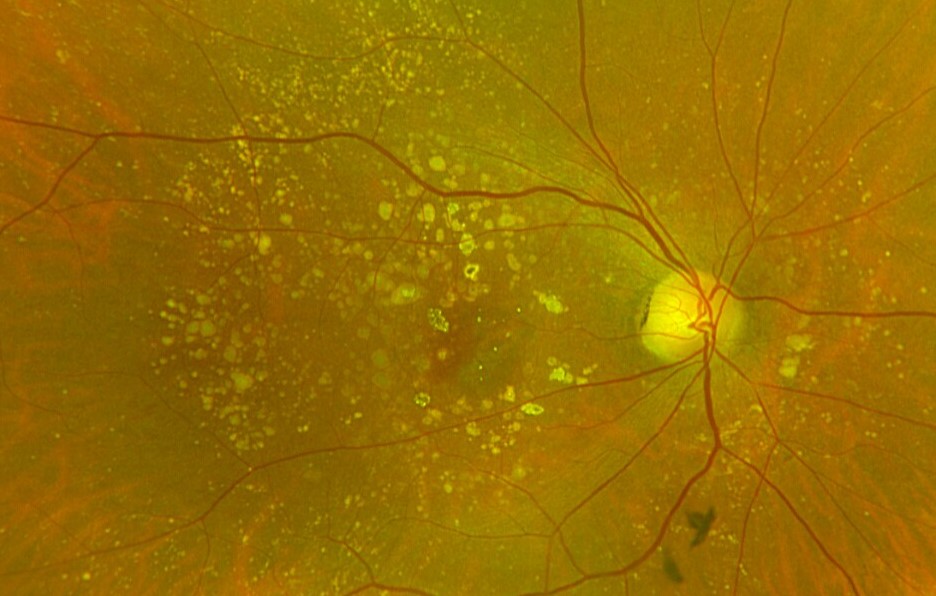Macular Degeneration
What is Macular Degeneration?
Age-related macular degeneration (ARMD) is the commonest cause of vision loss in people aged over 60 years old. The prevalence (number of new cases each year) increases with age. It is caused by degeneration of the macula, the central and most sensitive part of the retina at the back of the eye.
What is The Macula?
The macula is the critical centre of the retina that facilitates the recognition of intricate details, such as small print and facial features. In contrast, the peripheral retina is primarily responsible for providing peripheral vision. A compromised macula can make these tasks difficult or even impossible, underscoring the critical role that it plays in visual function. Notably, the macula derives its name from the yellow pigment it contains, also known as macula lutea.
As individuals reach their 60s and 70s, the prevalence of macular degeneration increases significantly. By age 75, almost 15% of individuals will have developed this condition to some extent. The primary risk factor for this degenerative disease is age, though other factors such as a family history of the condition, cigarette smoking, and white Caucasian ethnicity may also increase the likelihood of developing macular degeneration. Prompt medical attention is essential for managing this condition effectively and preserving visual function.

What Are The Types of Age-Related Macular Degeneration?
Age-related macular degeneration (ARMD) is typically classified into two main types, commonly referred to as Dry ARMD and Wet ARMD. The pathological mechanisms underlying these two forms of ARMD are distinct. In Wet ARMD, abnormal blood vessels proliferate beneath the macula, while Dry ARMD involves the collection of small yellow deposits within the retina (referred to as drusen) and the degeneration (atrophy) of retinal tissue at the macula. Around 10% of patients convert from Dry to Wet.Although the dry form of ARMD is more common, the wet form can be more sudden and devastating to vision. It is essential to monitor any changes in vision carefully and seek prompt medical attention if symptoms arise. Early detection and appropriate management can help preserve visual function and mitigate the long-term impact of ARMD.How do detect ARMD?
Traditional methods are to look at the macula with a bright light. We for many years before other opticians have been using the Heidelberg Spectralis OCT scan, it has the highest resolution and progression software, if you have any signs of ARMD – we will detect it.Can you treat ARMD?
Wet ARMD is treated in hospital with injections, whilst ‘treatment’ sounds good, its damage limitation. The key is reduce the risk of conversion from Dry to Wet, which our optometrist can advise on and offer treatment-book now !Dry ARMD has recently had a breakthrough, the Lumithera Valeda is a non-invasive light therapy which with a 3 year clinical study has shown slow down the progression and can improve vision.Eye Health
Cataracts
Cataracts cause clouding of the lens, resulting in blurred vision. We offer cataract evaluations and advanced surgical options to restore your vision and improve your quality of life.
Diabetes
Diabetes can have a significant impact on eye health, causing conditions like diabetic retinopathy. We work collaboratively with your healthcare team to manage and monitor any diabetes-related eye concerns.
Glaucoma
Glaucoma is a progressive eye disease that damages the optic nerve and can lead to vision loss. We offer comprehensive screenings and advanced treatments to manage glaucoma, ensuring early detection and care for our patients.
Hyperopia
Hyperopia, or farsightedness, makes it difficult to focus on close objects. Our skilled optometrists can provide accurate assessments and recommend appropriate corrective measures.
Macular Degeneration
Macular degeneration affects central vision and can lead to significant visual impairment. Our experts provide comprehensive evaluations and offer guidance on lifestyle modifications and treatment options to help preserve your vision.
Myopia
Myopia, or near-sightedness, causes difficulty in seeing distant objects clearly. We offer various corrective options to address myopia and provide clear vision.
Nystagmus
Nystagmus is an involuntary eye movement that can affect vision. Our professionals can diagnose and manage nystagmus, providing strategies and resources to optimise your visual function.
Presbyopia
Presbyopia is an age-related condition that affects near vision. We can guide you through available options, including progressive lenses or multifocal contact lenses, to enhance your reading and close-up vision.
Retinitis Pigmentosa
Retinitis pigmentosa is a genetic disorder that leads to progressive vision loss. Our team can provide specialised care and support to help manage the condition and improve your quality of life.
